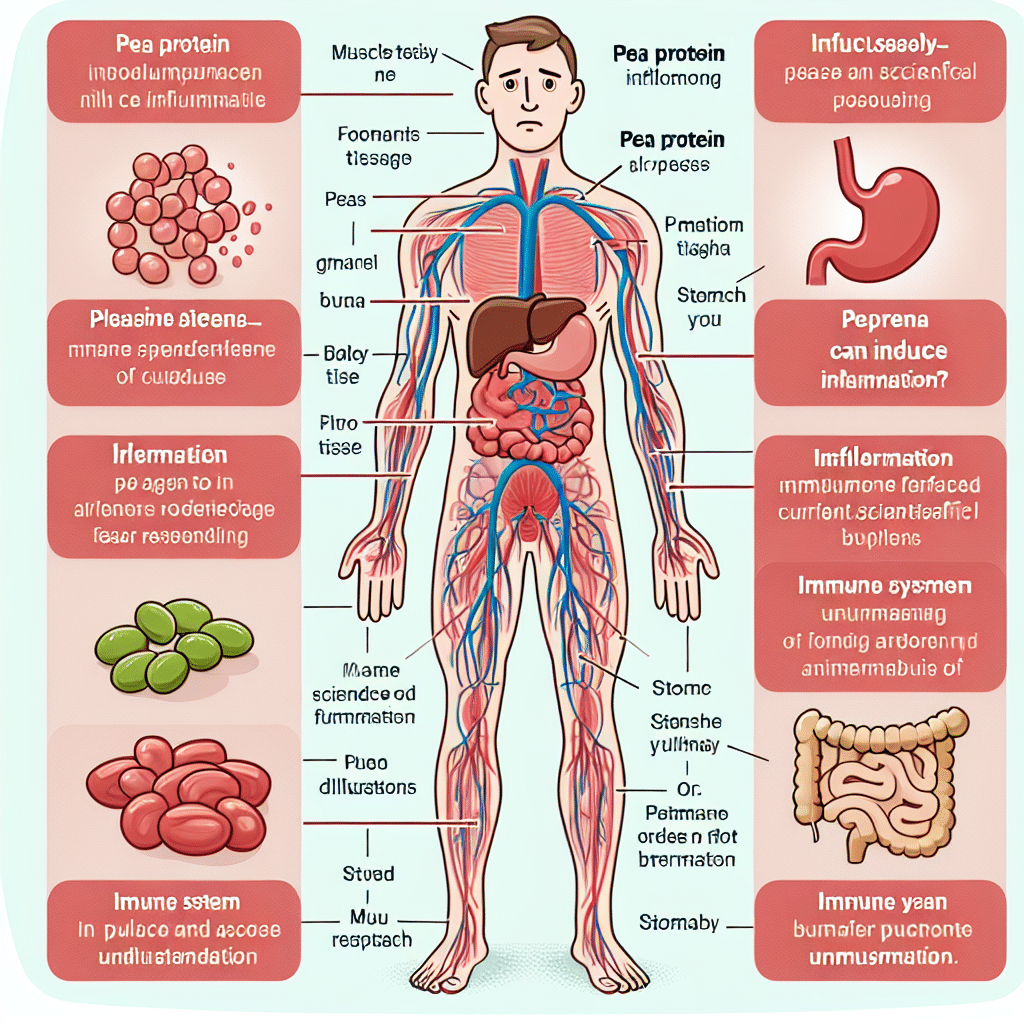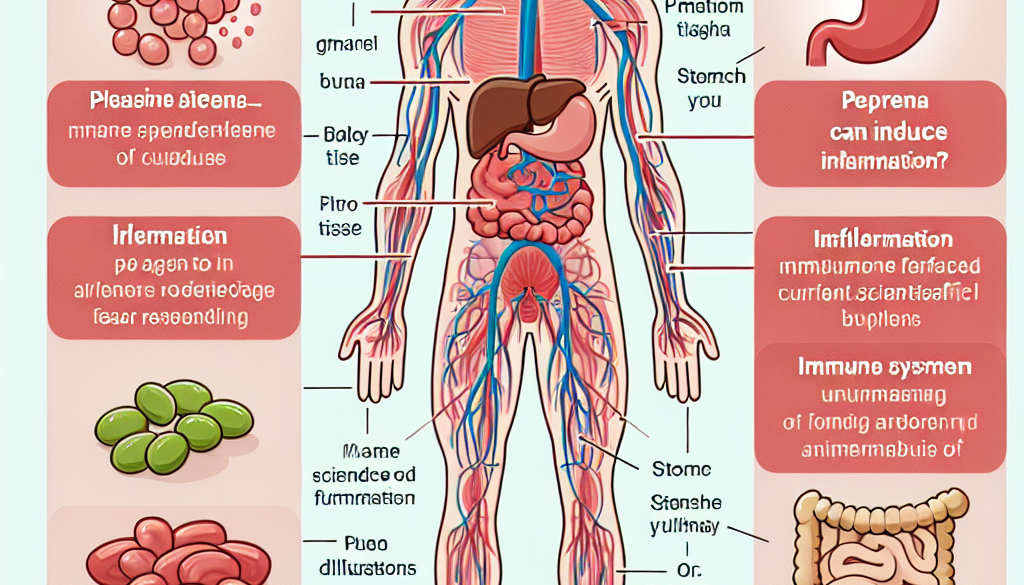Can pea protein cause inflammation in the body?
-
Table of Contents
- Pea Protein and Inflammation: Unraveling the Truth
- Understanding Inflammation and Its Causes
- Pea Protein: A Nutritional Overview
- Investigating Pea Protein’s Link to Inflammation
- Scientific Research on Pea Protein and Inflammation
- Case Studies and Anecdotal Evidence
- Conclusion: Pea Protein as an Anti-Inflammatory Option
- Discover ETprotein’s Premium Pea Protein Products
Pea Protein and Inflammation: Unraveling the Truth

With the rise of plant-based diets and the increasing demand for alternative protein sources, pea protein has emerged as a popular choice for many health-conscious individuals. However, as with any dietary component, it’s essential to understand its effects on the body, particularly when it comes to inflammation—a response linked to a host of chronic diseases. This article delves into the question: Can pea protein cause inflammation in the body?
Understanding Inflammation and Its Causes
Inflammation is the body’s natural response to protect itself against harm. There are two types of inflammation: acute and chronic. Acute inflammation is the immediate, short-term response to an injury or infection, while chronic inflammation is a prolonged, often less noticeable response that can contribute to various diseases over time.
Chronic inflammation can be triggered by a number of factors, including:
- Poor diet
- Lack of exercise
- Stress
- Exposure to toxins
- Genetic predisposition
Understanding the dietary factors that can influence inflammation is crucial for maintaining overall health.
Pea Protein: A Nutritional Overview
Pea protein is derived from yellow split peas and is a high-quality source of plant-based protein. It contains all nine essential amino acids, making it a complete protein, which is not always the case with plant proteins. Additionally, pea protein is rich in branched-chain amino acids (BCAAs), particularly arginine, which is beneficial for heart health and circulation.
Investigating Pea Protein’s Link to Inflammation
When it comes to inflammation, not all proteins are created equal. Animal-based proteins, particularly red and processed meats, have been associated with increased levels of inflammation. In contrast, plant-based proteins, such as pea protein, are often considered to be anti-inflammatory due to their nutrient profile and the presence of beneficial phytochemicals.
Several factors contribute to pea protein’s potential anti-inflammatory effects:
- Antioxidant properties: Pea protein contains antioxidants that can neutralize free radicals, reducing oxidative stress and inflammation.
- Low levels of potentially inflammatory compounds: Unlike some animal proteins, pea protein is naturally low in substances like heme iron and saturated fats, which have been linked to inflammation.
- High digestibility: Pea protein is easily digested, which can reduce the potential for an inflammatory response in the gut.
Scientific Research on Pea Protein and Inflammation
Research on pea protein and its effects on inflammation is still emerging, but some studies have shown promising results. For example, a study published in the Journal of Inflammation found that pea protein hydrolysate had anti-inflammatory effects in rats. Another study in the Journal of Agricultural and Food Chemistry reported that peptides derived from pea protein inhibited enzymes that play a role in inflammation.
However, it’s important to note that individual responses to pea protein can vary. Some people may have sensitivities or allergies to peas, which could lead to an inflammatory response. It’s always recommended to listen to your body and consult with a healthcare professional if you experience any adverse reactions.
Case Studies and Anecdotal Evidence
While scientific studies are invaluable, anecdotal evidence and case studies also provide insight into pea protein’s effects on inflammation. Many individuals who have switched from animal-based to plant-based proteins, including pea protein, report reduced joint pain, improved digestion, and other signs of decreased inflammation.
It’s worth considering these personal experiences, as they can highlight the potential benefits of incorporating pea protein into one’s diet. However, anecdotal evidence should not replace scientific research but rather complement it.
Conclusion: Pea Protein as an Anti-Inflammatory Option
In conclusion, the current body of research and anecdotal reports suggest that pea protein is unlikely to cause inflammation in the body and may, in fact, have anti-inflammatory properties. Its high-quality protein content, antioxidant presence, and low levels of inflammatory compounds make it a promising option for those looking to reduce inflammation through diet.
As with any dietary change, it’s essential to consider individual health conditions and consult with a healthcare professional. For most people, pea protein can be a valuable addition to a balanced, anti-inflammatory diet.
Discover ETprotein’s Premium Pea Protein Products
If you’re interested in exploring the benefits of pea protein, ETprotein offers a range of high-quality pea protein products that can support your health and wellness goals. Their pea protein is characterized by a neutral taste, non-GMO, and allergen-free attributes, ensuring that you can enjoy the benefits of this plant-based protein without any unwanted side effects.
ETprotein’s commitment to purity and quality makes their pea protein an excellent choice for anyone looking to incorporate a clean, sustainable protein source into their diet. Whether you’re an athlete, a busy professional, or simply someone who cares about their health, ETprotein has a pea protein product to meet your needs.
About ETprotein:
ETprotein, a reputable protein and L-(+)-Ergothioneine (EGT) Chinese factory manufacturer and supplier, is renowned for producing, stocking, exporting, and delivering the highest quality organic bulk vegan proteins and L-(+)-Ergothioneine. They include Organic rice protein, clear rice protein, pea protein, clear pea protein, watermelon seed protein, pumpkin seed protein, sunflower seed protein, mung bean protein, peanut protein, and L-(+)-Ergothioneine EGT Pharmaceutical grade, L-(+)-Ergothioneine EGT food grade, L-(+)-Ergothioneine EGT cosmetic grade, L-(+)-Ergothioneine EGT reference grade and L-(+)-Ergothioneine EGT standard. Their offerings, characterized by a neutral taste, non-GMO, allergen-free attributes, with L-(+)-Ergothioneine purity over 98%, 99%, cater to a diverse range of industries. They serve nutraceutical, pharmaceutical, cosmeceutical, veterinary, as well as food and beverage finished product distributors, traders, and manufacturers across Europe, USA, Canada, Australia, Thailand, Japan, Korea, Brazil, and Chile, among others.
ETprotein specialization includes exporting and delivering tailor-made protein powder and finished nutritional supplements. Their extensive product range covers sectors like Food and Beverage, Sports Nutrition, Weight Management, Dietary Supplements, Health and Wellness Products, and Infant Formula, ensuring comprehensive solutions to meet all your protein needs.
As a trusted company by leading global food and beverage brands and Fortune 500 companies, ETprotein reinforces China’s reputation in the global arena. For more information or to sample their products, please contact them and email sales(at)ETprotein.com today.














